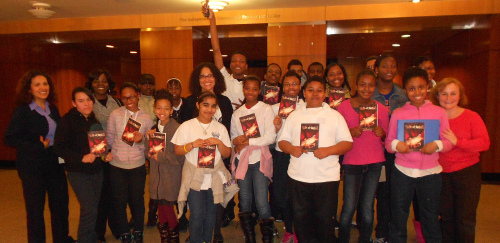Zetta Elliott's Blog, page 66
May 21, 2013
overflow
 I have SO many things to write about but can’t get a reliable internet connection and Facebook, when I can log on, won’t upload my photos…so stay tuned. More details about the conference and our trip to Elmina will follow in a day or so…
I have SO many things to write about but can’t get a reliable internet connection and Facebook, when I can log on, won’t upload my photos…so stay tuned. More details about the conference and our trip to Elmina will follow in a day or so…


May 17, 2013
day of the dead
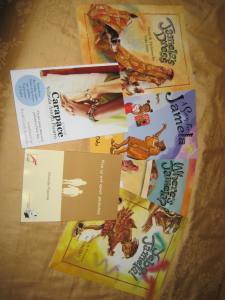 There’s a reading tonight hosted by the Pan-African Writers Association (PAWA) but I was simply too tired to attend; I think jet lag is finally setting in so I opted to stay at the hotel, order room service, and work on my presentation on “configuring the past and present.” I can hear a preacher screaming “Hallelujah!” outside—there must be a church nearby. I’m watching Ghana TV and a women’s show, The Standpoint, just ended—the Oprah equivalent Dr. Gifty had guests and experts on to discuss life after your husband’s death. This has been a day of death, in a way—today’s program ended with an emotional tribute to Jayne Cortez, OWWA co-founder who passed suddenly last December. I only met Jayne twice but it was clear to me that she was a formidable woman. I was surprised to find myself shedding a few tears during the tribute; I watched Ama Ata Aidoo being helped to her feet—someone holding her cane, someone else holding the mic so her hands were free to hold the bowl—and then she spoke in Fante because she knew Jayne wouldn’t want a libation prayer to be said in English. She had to pause midway to pull a kerchief from her blouse and it was very moving to see this elder weeping for her lost friend. They met in the 1970s so that’s a friendship that lasted nearly fifty years, and I couldn’t help but think to myself, “That will be us someday.” I feel so blessed to be here with my close friends—my life has been enriched and enlarged because of these incredible black women who don’t have the anxiety issues that make me too risk-averse and too content to stay at home. Would I have come to Ghana without them? Maybe, but I’m grateful that they continue to ”lift me as they climb.”
There’s a reading tonight hosted by the Pan-African Writers Association (PAWA) but I was simply too tired to attend; I think jet lag is finally setting in so I opted to stay at the hotel, order room service, and work on my presentation on “configuring the past and present.” I can hear a preacher screaming “Hallelujah!” outside—there must be a church nearby. I’m watching Ghana TV and a women’s show, The Standpoint, just ended—the Oprah equivalent Dr. Gifty had guests and experts on to discuss life after your husband’s death. This has been a day of death, in a way—today’s program ended with an emotional tribute to Jayne Cortez, OWWA co-founder who passed suddenly last December. I only met Jayne twice but it was clear to me that she was a formidable woman. I was surprised to find myself shedding a few tears during the tribute; I watched Ama Ata Aidoo being helped to her feet—someone holding her cane, someone else holding the mic so her hands were free to hold the bowl—and then she spoke in Fante because she knew Jayne wouldn’t want a libation prayer to be said in English. She had to pause midway to pull a kerchief from her blouse and it was very moving to see this elder weeping for her lost friend. They met in the 1970s so that’s a friendship that lasted nearly fifty years, and I couldn’t help but think to myself, “That will be us someday.” I feel so blessed to be here with my close friends—my life has been enriched and enlarged because of these incredible black women who don’t have the anxiety issues that make me too risk-averse and too content to stay at home. Would I have come to Ghana without them? Maybe, but I’m grateful that they continue to ”lift me as they climb.”
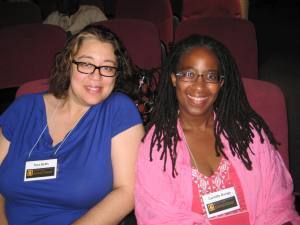 I don’t think I can do justice to the four panels I attended today. The first was on getting your work out into the world, and moderator Tara Betts (right, with Camille Dungy) drew rich insights from the three panelists. Latasha Diggs (below right, with Gabrielle Civil)reminded us that it’s not *always* about the book—having one doesn’t make you legitimate, doing the WORK and getting it out there (by yourself, if necessary) is what matters most along with building community. How can you ward off competition between you and your fellow writers? Hang with musicians and other artists working in different media. Kadija George Sesay, publisher of Sable magazine, urged self-publishers to register their publications and get an ISBN/ISSN; that means your work can be catalogued, archived, and then you can be certain that you’re
I don’t think I can do justice to the four panels I attended today. The first was on getting your work out into the world, and moderator Tara Betts (right, with Camille Dungy) drew rich insights from the three panelists. Latasha Diggs (below right, with Gabrielle Civil)reminded us that it’s not *always* about the book—having one doesn’t make you legitimate, doing the WORK and getting it out there (by yourself, if necessary) is what matters most along with building community. How can you ward off competition between you and your fellow writers? Hang with musicians and other artists working in different media. Kadija George Sesay, publisher of Sable magazine, urged self-publishers to register their publications and get an ISBN/ISSN; that means your work can be catalogued, archived, and then you can be certain that you’re 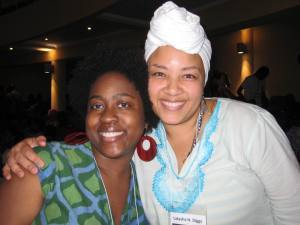 leaving a record behind.
leaving a record behind.
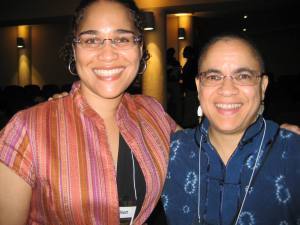 During the brief break Michelle Martin and I went down to the book vendors and did a bit of shopping. No more books! I think I’ve bought ten so far, mostly for my nieces and nephew, though I got a couple of novels for myself today. It’s so wonderful to have the authors sign their books, too. I had lunch with Yolanda Arroyo Pizarro and was thrilled to get an English translation of her novel, Carapace. She and her partner Zulma also wrote out a list of Afro-Latino women writers whose work is available in English. I want to add more Latina content to my Black Women in the Americas class. I was disturbed to learn that Yolanda and Zulma were harassed and threatened in the Osu market earlier this week, but it was wonderful to learn that their homeland of Puerto Rico recently passed legislation protecting the rights of LGBT people. Maybe the jetlag is making me emotional or maybe it’s just being in the presence of so many amazing women—I feel protective of everyone! Protective and powerless at the same time. I should switch gears and go work on my talk because these are the issues I want to address: is it enough to rewrite history, to write black women back into the historical record through art and/or scholarship, or must we MAKE history ourselves? I feel like history is made by women who are bolder than me, but maybe that’s just what I want to believe…
During the brief break Michelle Martin and I went down to the book vendors and did a bit of shopping. No more books! I think I’ve bought ten so far, mostly for my nieces and nephew, though I got a couple of novels for myself today. It’s so wonderful to have the authors sign their books, too. I had lunch with Yolanda Arroyo Pizarro and was thrilled to get an English translation of her novel, Carapace. She and her partner Zulma also wrote out a list of Afro-Latino women writers whose work is available in English. I want to add more Latina content to my Black Women in the Americas class. I was disturbed to learn that Yolanda and Zulma were harassed and threatened in the Osu market earlier this week, but it was wonderful to learn that their homeland of Puerto Rico recently passed legislation protecting the rights of LGBT people. Maybe the jetlag is making me emotional or maybe it’s just being in the presence of so many amazing women—I feel protective of everyone! Protective and powerless at the same time. I should switch gears and go work on my talk because these are the issues I want to address: is it enough to rewrite history, to write black women back into the historical record through art and/or scholarship, or must we MAKE history ourselves? I feel like history is made by women who are bolder than me, but maybe that’s just what I want to believe…
 The afternoon panel on Africa, the diaspora, and children’s literature was great. One Ghanaian panelist talked about the need to ensure that girls on the continent have access to education—whether it’s in a traditional school, via cell phone, or on the radio. Another Nigerian panelist, Akachi Ezeigbo, talked about her decision to write girls as heroines in her books for young readers, and Michelle Martin captivated the audience with her slideshow and talk on hair politics in children’s picture books. Deborah Ahenkorah doubled as panelist and moderator and had a chance to share her innovative strategies for getting books into the hands of Ghanaian kids. “If we can send a man to Mars, we can ensure that Ghanaian children have culturally relevant, quality books!” Stay tuned for an interview with Deborah in the next day or two…
The afternoon panel on Africa, the diaspora, and children’s literature was great. One Ghanaian panelist talked about the need to ensure that girls on the continent have access to education—whether it’s in a traditional school, via cell phone, or on the radio. Another Nigerian panelist, Akachi Ezeigbo, talked about her decision to write girls as heroines in her books for young readers, and Michelle Martin captivated the audience with her slideshow and talk on hair politics in children’s picture books. Deborah Ahenkorah doubled as panelist and moderator and had a chance to share her innovative strategies for getting books into the hands of Ghanaian kids. “If we can send a man to Mars, we can ensure that Ghanaian children have culturally relevant, quality books!” Stay tuned for an interview with Deborah in the next day or two…
The fourth panel was intense; four writers talked about their activism and the ways they channel the ancestors in order to better serve their community around issues like environmental justice and domestic violence. You can learn more about the important, community-based projects coordinated by Angelique Nixon’s nonprofit Ayiti Resurrect. Moderator (and friend!) Ira Dworkin moderated and gave us all an update on the challenges facing women writers in Egypt. You can learn more about the threats facing Mona Prince here.
Ok, time to turn in. I haven’t actually left the hotel compound yet so I’m looking forward to tomorrow’s lineup, which includes a performance by Wura-Natasha Ogunji, Rosamond S. King, and Gabrielle Civil. We start here and then finish at the seashore…


May 16, 2013
Akwaaba!
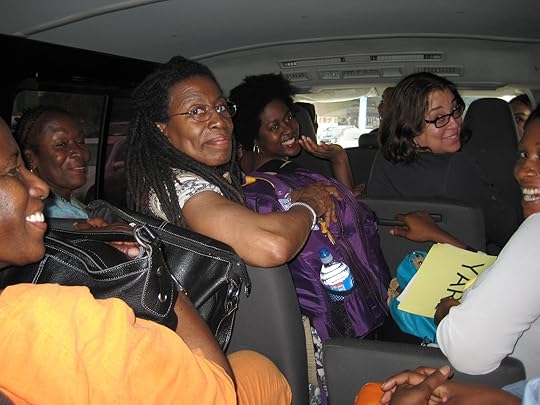 I feel a bit guilty because I’m in my hotel room when I should be downstairs participating in Gabrielle Civil’s performance workshop. But I ran into G on my way upstairs and she said I was overdressed so I decided to change and then realized I was starving and so ordered room service instead. My first day in Accra has been wonderful–there was some randomness at the terminal but Rashidah Ismaili herded us together, we got our visas stamped, and we all boarded the plane ready to get some sleep. The flight was fairly uneventful except for some serious turbulence on the way down, but we landed with no problem and made our way through customs without a hitch. There was a disturbing sign at the airport–I couldn’t decide whether or not to take a photo, but it basically said “Welcome! Unless you’re a pedophile or other sexual deviant, in which case you should go someplace else.” There’s a sexuality panel at the conference and I’ll be interested to know just who qualifies as “deviant” in this country. We piled into the van that was waiting for us and our guide chatted amiably as we drove to the hotel. She asked everyone which country they were from and then noted our race–or mine, anyway, which she declared to be “white.” Rashidah went off and reminded us all of Nkrumah’s message on Pan-Africanism: “We are all African!” Here, except for Rashidah (below, right) who was born in Ghana, we are all “obruni”–maybe not white, but foreign. And we’re all hyphenated–born in one place,
I feel a bit guilty because I’m in my hotel room when I should be downstairs participating in Gabrielle Civil’s performance workshop. But I ran into G on my way upstairs and she said I was overdressed so I decided to change and then realized I was starving and so ordered room service instead. My first day in Accra has been wonderful–there was some randomness at the terminal but Rashidah Ismaili herded us together, we got our visas stamped, and we all boarded the plane ready to get some sleep. The flight was fairly uneventful except for some serious turbulence on the way down, but we landed with no problem and made our way through customs without a hitch. There was a disturbing sign at the airport–I couldn’t decide whether or not to take a photo, but it basically said “Welcome! Unless you’re a pedophile or other sexual deviant, in which case you should go someplace else.” There’s a sexuality panel at the conference and I’ll be interested to know just who qualifies as “deviant” in this country. We piled into the van that was waiting for us and our guide chatted amiably as we drove to the hotel. She asked everyone which country they were from and then noted our race–or mine, anyway, which she declared to be “white.” Rashidah went off and reminded us all of Nkrumah’s message on Pan-Africanism: “We are all African!” Here, except for Rashidah (below, right) who was born in Ghana, we are all “obruni”–maybe not white, but foreign. And we’re all hyphenated–born in one place, 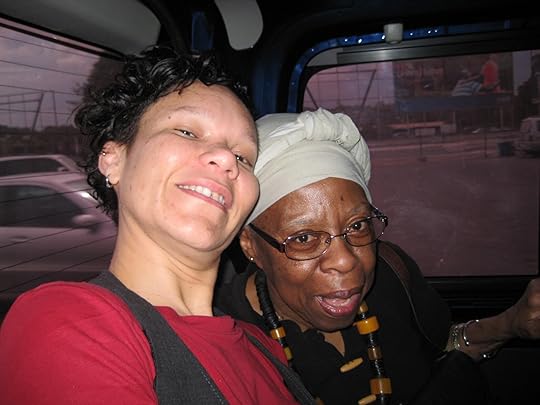 living in another. The guide explained that she only meant to say I was “bright,” and I wasn’t offended. Frankly, we were having too much fun–imagine being in a van full of black women scholars, artists, and writers! This is heaven for me. When we got to our rooms we cleaned up and then joined the conference organizers Rosa, Kinna, and Jaira in the lounge. They promptly ordered food for us (Ghanaian food is delicious but SPICY) and we relaxed for a while before filling the goody bags for participants and VIPs. The warmest welcome came from Kinna Likimani (below, left) who blogs at Kinna Reads (she’s also the daughter of Ama Ata Aidoo and director of Mbasem, a foundation founded by Aidoo that promotes African women writers). I was amazed and honored to learn that *I* was the person she was most looking forward to meeting! Today we spent an hour talking about the challenges promoting literacy in Ghana. I think Kinna’s onto something when she talks about the need to collaborate with churches. One church here gathered 5000 children for a discussion on “developing good habits.” And, of course, one such habit is reading books! And buying books, and treating them like the valuable tools they are.
living in another. The guide explained that she only meant to say I was “bright,” and I wasn’t offended. Frankly, we were having too much fun–imagine being in a van full of black women scholars, artists, and writers! This is heaven for me. When we got to our rooms we cleaned up and then joined the conference organizers Rosa, Kinna, and Jaira in the lounge. They promptly ordered food for us (Ghanaian food is delicious but SPICY) and we relaxed for a while before filling the goody bags for participants and VIPs. The warmest welcome came from Kinna Likimani (below, left) who blogs at Kinna Reads (she’s also the daughter of Ama Ata Aidoo and director of Mbasem, a foundation founded by Aidoo that promotes African women writers). I was amazed and honored to learn that *I* was the person she was most looking forward to meeting! Today we spent an hour talking about the challenges promoting literacy in Ghana. I think Kinna’s onto something when she talks about the need to collaborate with churches. One church here gathered 5000 children for a discussion on “developing good habits.” And, of course, one such habit is reading books! And buying books, and treating them like the valuable tools they are.  We also talked about the need to get quality books into the schools—books that aren’t holdovers from British colonial rule but rather reflect the contemporary realities of African children. I also met Deborah Ahenkorah (right) this morning–this amazing Bryn Mawr graduate was at her booth promoting her organization Golden Baobab, which also promotes literacy and African writers of children’s literature. It’s inspiring to see women here in Ghana tackling the very same issues we face in the US and Canada–there’s so much to learn and share!
We also talked about the need to get quality books into the schools—books that aren’t holdovers from British colonial rule but rather reflect the contemporary realities of African children. I also met Deborah Ahenkorah (right) this morning–this amazing Bryn Mawr graduate was at her booth promoting her organization Golden Baobab, which also promotes literacy and African writers of children’s literature. It’s inspiring to see women here in Ghana tackling the very same issues we face in the US and Canada–there’s so much to learn and share!
Ok, my lunch arrived and I stopped to devour it (joloff rice with vegetables and fresh pineapple, which is white here, not yellow, and much sweeter), which left my lips burning (pepper!) so I went in search of more water. Then the power went out for a moment so I think I better wrap this up and head back downstairs for the first panel on Identity and 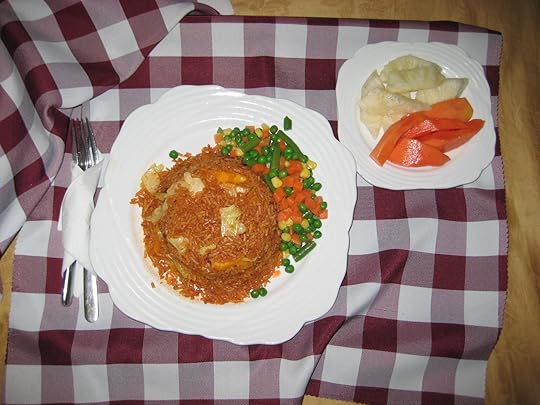 Creativity. Then it’s time for the opening plenary, which will feature Ama Ata Aidoo and Angela Davis in conversation! And then we have the reception hosted by NYU Ghana. I’m pacing myself—woke with a headache this morning and so skipped breakfast and slept a while longer. I went downstairs to the terrace and bought some books and a cool t-shirt from Deborah,
Creativity. Then it’s time for the opening plenary, which will feature Ama Ata Aidoo and Angela Davis in conversation! And then we have the reception hosted by NYU Ghana. I’m pacing myself—woke with a headache this morning and so skipped breakfast and slept a while longer. I went downstairs to the terrace and bought some books and a cool t-shirt from Deborah, 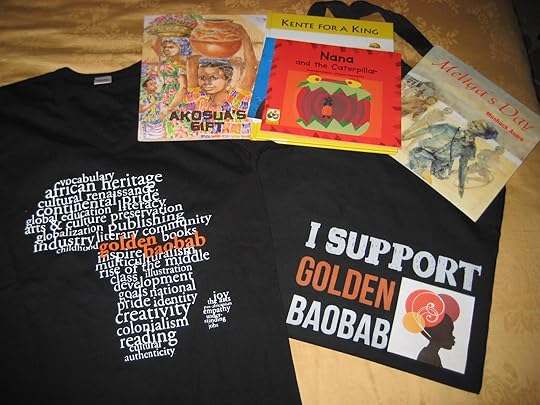 chatted with her and Kinna, and then came back up for lunch. International travel is daunting in some ways, but I’ve got an awesome support team and already feel motivated to do *more* when I get back to NYC. Yesterday Rosa asked for suggestions—what do you ask Angela Davis before she receives a lifetime achievement award? I said, “If Assata Shakur is now a terrorist and a threat to national security, what does that say about the rest of us?” It means women writers of African descent are DANGEROUS! The world better watch out…
chatted with her and Kinna, and then came back up for lunch. International travel is daunting in some ways, but I’ve got an awesome support team and already feel motivated to do *more* when I get back to NYC. Yesterday Rosa asked for suggestions—what do you ask Angela Davis before she receives a lifetime achievement award? I said, “If Assata Shakur is now a terrorist and a threat to national security, what does that say about the rest of us?” It means women writers of African descent are DANGEROUS! The world better watch out…


April 28, 2013
limbo
 The park was beautiful this morning but I’m paying for it now–the tissue box is nearly empty and my nose is sore from constant blowing. I’ve decided not to venture back out, which means today is the day I *finally* sit down and start working on my latest round of revisions. For the past month I’ve been working on three academic articles, all of which are to be published this year. One essay (on Richard Wright) was actually written while I was in graduate school in the late ’90s! I worked it into my dissertation and then recycled it again when they held the centenary conference on Wright in 2008. And now, in 2013, the essay is going to be included in an anthology on the brilliant but problematic (for me) African American author. Revising something you wrote more than ten years ago is hard, and converting a conference paper often means taking out all the conversational bits that personalized your point of view. Preparing these essays for publication reminds me why I don’t like academic writing, yet in my profession it’s a necessary evil so I’ve refrained from reminding my editors that “the personal is political.” The other two essays are on children’s literature, which also feels odd since that’s not my area of expertise, but once they’re published I will close that chapter and return to critiquing adult lit. I’m waiting on a contract for The Deep and another offer may be on the way…or not. So instead of ruminating on the possibilities I’m trying to remember what my agenda was when I first wrote these essays. I know I had a different voice in the ’90s, but was I a different person last summer? I don’t think so, but I was writing under duress after accepting a last minute invitation to contribute to a different anthology. Those editors wanted me to act like I wasn’t the author of my own books so I withdrew the essay and now have a chance to expand it for a Canadian journal. That also makes me a little uneasy, considering the cool reception I’ve received as an author in the Great White North. But nothing ventured, nothing gained, right? Back to work…
The park was beautiful this morning but I’m paying for it now–the tissue box is nearly empty and my nose is sore from constant blowing. I’ve decided not to venture back out, which means today is the day I *finally* sit down and start working on my latest round of revisions. For the past month I’ve been working on three academic articles, all of which are to be published this year. One essay (on Richard Wright) was actually written while I was in graduate school in the late ’90s! I worked it into my dissertation and then recycled it again when they held the centenary conference on Wright in 2008. And now, in 2013, the essay is going to be included in an anthology on the brilliant but problematic (for me) African American author. Revising something you wrote more than ten years ago is hard, and converting a conference paper often means taking out all the conversational bits that personalized your point of view. Preparing these essays for publication reminds me why I don’t like academic writing, yet in my profession it’s a necessary evil so I’ve refrained from reminding my editors that “the personal is political.” The other two essays are on children’s literature, which also feels odd since that’s not my area of expertise, but once they’re published I will close that chapter and return to critiquing adult lit. I’m waiting on a contract for The Deep and another offer may be on the way…or not. So instead of ruminating on the possibilities I’m trying to remember what my agenda was when I first wrote these essays. I know I had a different voice in the ’90s, but was I a different person last summer? I don’t think so, but I was writing under duress after accepting a last minute invitation to contribute to a different anthology. Those editors wanted me to act like I wasn’t the author of my own books so I withdrew the essay and now have a chance to expand it for a Canadian journal. That also makes me a little uneasy, considering the cool reception I’ve received as an author in the Great White North. But nothing ventured, nothing gained, right? Back to work…


April 21, 2013
making change from within
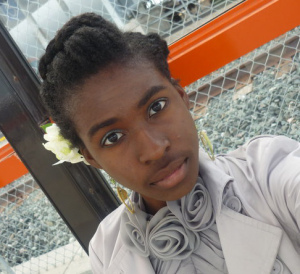 I’m not on Twitter much but on one of my recent visits I discovered a young black woman who’s doing her best to promote diversity in the Canadian children’s publishing industry. I recently had an unproductive exchange with a book festival director in Toronto so I’m very pleased to share this interview with Léonicka Valcius.
I’m not on Twitter much but on one of my recent visits I discovered a young black woman who’s doing her best to promote diversity in the Canadian children’s publishing industry. I recently had an unproductive exchange with a book festival director in Toronto so I’m very pleased to share this interview with Léonicka Valcius.
Tell us a little bit about yourself.
I am a young black woman with fabulous hair. I have many passions: some serious (social justice, economic inequality, oppression) and some frivolous (food, fashion, entertainment). I just started my career as a publishing professional and I have two commitments: to be the authors’ advocate and to promote diversity in publishing. (These are my opinions and do not necessarily reflect those of my employer.)
As a black child growing up in Toronto, I never saw myself in Canadian books and knew nothing about opportunities in the arts. Describe your evolution from a girl who loved reading to a book blogger and publishing professional.
It was such a long, winding path. Very much a case of growing into who you were meant to be.
I am Haitian-Canadian. I was born in Montreal but grew up in Florida, and I didn’t see much of myself in books either. The sad part is I never thought to look. I have always loved historical fiction and SFF, so somewhere along the line I took it for granted that people like me were never princesses, or warriors, or explorers. It didn’t bother me at the time because I didn’t realize it was a problem. I lived and went to school in a predominately white area and was used to being the only black girl in the room. In that way, the books I read reinforced that reality. Even when I wrote my own stories they featured blond-haired protagonists.
In high school and university I practically stopped reading books for fun—I had so much school reading to do! But I stayed connected to other readers by joining FictionPress.com. Though I am not much of a writer, I had been editing for my peers for years and continued to do so online. So when I hit that point where I had to decide what to do with my life, I took a look at what I was doing with my free time. Working in publishing was just the logical extension of my passions.
It’s not exactly encouraging to hear everyone screaming “publishing is dead!” when you are in publishing school. And after being surrounded by people of color at Florida Atlantic University and then University of Toronto, returning to a predominantly white environment was jarring. But I didn’t know any of that before going in. Perhaps if I had, I would have been more reticent and assumed that “people like me” didn’t belong in the industry. My ignorance worked to my benefit in this case.
I am also incredibly blessed. I was only able to afford publishing school and six months of internships because I live with my parents. I don’t pay rent. I don’t pay for food. My parents signed for my loan and covered my transportation costs when money was super tight. For people without those luxuries, getting into publishing is especially difficult (but not impossible).
Getting my job was a combination of hard work, support from my network, and divine intervention. My job is fast-paced and sometimes stressful but I love every bit of it. And how could I not? I get to share books with kids! I work for Scholastic Book Fairs Canada. I am the Junior Product Manager for their French division, Festival du Livre. I’m essentially a book buyer and marketer rolled into one. I purchase French children’s books, which are then sold in French book fairs hosted by schools across Canada, and I promote these books and the fairs through print and web marketing.
I fell into children’s publishing by accident. In fact I distinctly remember actively avoiding it. I thought it was too specialized, too idiosyncratic and that it was not the place for a beginner like me. But of course, God’s plans were greater than mine. Even though I love children’s books personally, and I loved my visit to the Scholastic offices, I still said “probably adult fiction” when people asked what type of books I wanted to work with. Then Ali McDonald, the children’s literary agent at The Rights Factory (where I had my first internship,) took me to the Festival of Trees. I’m forever in her debt.
I still try to blog here and there but I’m not nearly consistent enough to call myself a book blogger. I just try to engage with people who love books, both online and in real life.
You seem to be connected to the US children’s literature community. Compare the diversity and activism you see in the US to that in Canada. Are the challenges and/or solutions the same?
I’m only as connected as the internet allows me to be, though I am trying to learn as much as I can. Like in many industries it is useful to watch what the US is doing in terms of kidlit in order to get a heads up on upcoming trends.
Insofar as the challenge is to increase diversity in all levels of publishing (from the characters in the books, to the writers, to the people working in the pub houses) then yes, the challenges seem the same to me.
The differences emerge in visibility. The conversations about diversity in US kidlit are easy to find on various social media platforms. In Canada it seems to be considered a non-issue, especially because Canada clings to this rosy reputation for being open and multicultural. I have initiated every conversation about diversity that I’ve had in Canada. That said, there are many groups who are quietly doing the work to fix the problem.
What would you say to a black child in Toronto who has a vague interest in leading a “literary life”?
Read! Read everything, question everything, then read some more. Use the library at your school or in your city to look for black writers who write books similar to those you already like.
And write! I’m especially fond of fanfiction because it can be a great writing exercise. You already have the foundation of a story so you can be creative. What would happen if the protagonist was black? Was a girl? Was poor? Rich? Lived in the past? Lived in the future? The possibilities really are endless.
Finally, talk to your friends about the books you read the same way you’d talk to them about a movie you saw. Sharing your ideas helps you solidify your opinions or consider another point of view.
You can follow Léonicka on Twitter (@Leonicka) and you can find her blog here.


April 14, 2013
be happy?
“If you’re depressed, you’re living in the past. If you’re anxious, you’re living in the future. If you’re at peace, you’re living in the present.” -Lao Tzu
 I just sent this quote to a friend who’s in a funk; as someone who grapples with depression and anxiety, I find it useful and thought he might too. But then I read this response on “wisdom and foolishness in social media” (which questions the quote’s authenticity) and it reminded me of a post Neesha Meminger shared earlier this week about managing depression and responding to depression in others. It’s a serious condition and one that has no quick fix. I’m fortunate that depression (thus far) has had a limited impact on my life; in fact, I think my symptoms were most severe when I was a teenager, before I even knew what depression was. In my twenties I started reading books on the subject and I discovered that a number of my friends were struggling with depression too. We started checking in on each other and we reminded one another to eat right, exercise regularly, and follow the doctor’s orders—in our little community there was no shame in taking medication and/or seeing a therapist to manage depression. And it was okay to admit when we had fallen into “the abyss.” By the time I reached my thirties, anxiety had become the bigger issue for me and I learned that staying busy kept me from dwelling on situations over which I had no control (the cause of most anxiety). I never knew my mother also had anxiety issues but in the years since her retirement from teaching, I’ve witnessed her world getting smaller and smaller as she has more time to dwell on and/or avoid the things that stress her out—like driving on the highway or traveling alone. I look at my mother and see what my future could be, which makes me vigilant about managing my own symptoms NOW.
I just sent this quote to a friend who’s in a funk; as someone who grapples with depression and anxiety, I find it useful and thought he might too. But then I read this response on “wisdom and foolishness in social media” (which questions the quote’s authenticity) and it reminded me of a post Neesha Meminger shared earlier this week about managing depression and responding to depression in others. It’s a serious condition and one that has no quick fix. I’m fortunate that depression (thus far) has had a limited impact on my life; in fact, I think my symptoms were most severe when I was a teenager, before I even knew what depression was. In my twenties I started reading books on the subject and I discovered that a number of my friends were struggling with depression too. We started checking in on each other and we reminded one another to eat right, exercise regularly, and follow the doctor’s orders—in our little community there was no shame in taking medication and/or seeing a therapist to manage depression. And it was okay to admit when we had fallen into “the abyss.” By the time I reached my thirties, anxiety had become the bigger issue for me and I learned that staying busy kept me from dwelling on situations over which I had no control (the cause of most anxiety). I never knew my mother also had anxiety issues but in the years since her retirement from teaching, I’ve witnessed her world getting smaller and smaller as she has more time to dwell on and/or avoid the things that stress her out—like driving on the highway or traveling alone. I look at my mother and see what my future could be, which makes me vigilant about managing my own symptoms NOW.
Lately I’ve been thinking about the ways anxiety and depression affect my writing. The past few weeks have been a little bumpy—I finished The Deep in early March and had a week of post-partum blues before immersing myself in a demanding post-doc application. Once that was submitted, I started revising an old conference paper that some editors would like to include in a new anthology. Now I’m trying to make some progress on Judah’s Tale. The semester’s winding down; I’m preparing to go to Ghana for the Yari Yari conference in mid-May. When I get back, final grades will be due and then the summer will begin, giving me close to three months to write. That prospect should fill me with joy, but there’s a part of me that worries about having so much unstructured time. I plan to conduct research in the Caribbean and I have a conference in St. Lucia in early August, but the idea of waking up day after day with nothing specific to do is a little bit terrifying. In part because I know that if I’m not focused on a writing project, I’m likely to succumb to bouts of anxiety about the future or depression around my past. I had a dream about my older sister last night—we barely speak and though I do wish things could be different between us, I know I wouldn’t be thinking about her if I were immersed in writing another novel. So do I use my writing to anchor myself in the present? Or do I use writing as a way to avoid the unresolved issues in my life? Maybe both.
Today I’m going to see a bit of fluff—that new Oz movie. I’ve been quite social lately, which is another way of filling up my free time so I don’t sit and ruminate. A trip to the garden might be in order too…


April 10, 2013
returning the favor
Last week I interviewed Kelbian Noel, a YA spec fic author that I met while I was up in Toronto. Yesterday Kelbian returned the favor by featuring me on her blog, Diverse Pages. Here’s one of the questions I was asked to consider:
DP: Have you always written about characters of color? What challenges (if any) have you faced in doing so?
ZETTA: When I took a creative writing class in high school, I wrote a picture book that featured white characters. Fortunately, I was failing that class and so wound up dropping it. In college I had my first black professor and he introduced me to the work of Jamaica Kincaid; that changed my academic focus and as I discovered more black authors, I began to write about people of color. I went through a process of “decolonizing my imagination” and it did take some time for me to develop authentic characters that came from the community where I lived. For a while I worried that readers would feel my characters weren’t “black enough,” but the more I traveled and the more widely I read, the easier it became to create credible, diverse black characters.
On Monday I met with a group of amazing young poets at the Brooklyn Public Library and one young writer showed me a picture book she had self-published–all her illustrations showed white children. I hope she finds a “mirror” for her black female self in my books. You can read the entire interview here.


April 2, 2013
see through
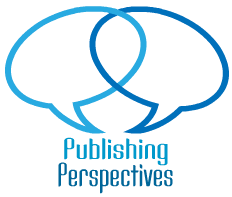 Summer Edward, Caribbean children’s literature specialist, is running a series on her website called “Publishing Perspectives” and today I’m her featured guest. Summer’s first question had to do with transparency:
Summer Edward, Caribbean children’s literature specialist, is running a series on her website called “Publishing Perspectives” and today I’m her featured guest. Summer’s first question had to do with transparency:
As a blogging author, is transparency something deliberate on your part? Or is it just sort of an inherent aspect of who Zetta Elliott is?
I’ve said for years that we need greater transparency in publishing, so I’d better practice what I preach! Mostly I think that’s part of who I am—and why I write. Some people blog just to promote their work or their image as an author; I think I use my blog more as a kind of journal, and friends have warned me about my openness. There are risks, but as Audre Lorde reminds us, “Your silence will not protect you.” I don’t expect to reach a point in my writing career when it’s “safe” for me to speak my mind, so I might as well do it now. Telling the truth doesn’t just help the speaker/writer, it helps those who are unable or unwilling to speak for themselves—and I do get messages from other writers thanking me for saying something their agent warned them against. I want change in the industry and that won’t come from staying silent when I see something unjust.
You can read the entire interview here.


April 1, 2013
meet Kelbian Noel!
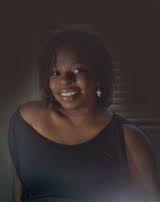 Kelbian Noel was born on a warm June night in Moncton, New Brunswick. From a very young age, she loved to read. She found herself engulfed in novels by Janette Oke and L.M. Montgomery, but never seemed to find herself in the pages. At the age of 11 she declared she would simply have to rewrite them and become the youngest author in history. Decades later, having studied writing in college and pursued it as a career, she rediscovered her hobby. She is excited to introduce The Witchbound Series to the world with hopes readers will love the beginning of this saga as much as she does.
Kelbian Noel was born on a warm June night in Moncton, New Brunswick. From a very young age, she loved to read. She found herself engulfed in novels by Janette Oke and L.M. Montgomery, but never seemed to find herself in the pages. At the age of 11 she declared she would simply have to rewrite them and become the youngest author in history. Decades later, having studied writing in college and pursued it as a career, she rediscovered her hobby. She is excited to introduce The Witchbound Series to the world with hopes readers will love the beginning of this saga as much as she does.
Kelbian lives in Toronto, Ontario with her two children. She is the founder of Diverse Pages and blogs there often in the company of some pretty cool people.
Kelbian’s first two novels are available *now* under special pricing. On April 1, Sprung will be available for $0.99, and Roots will continue to be free until the end of the day! Visit the author’s website for more information.
1. Your Witchbound Series is quite ambitious—can you tell us about the first two books and what we can expect from the other three?
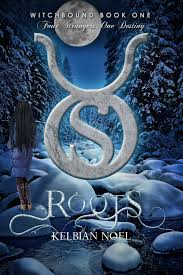 Witchbound tells the story of four very different girls. The five-book series follows each character as she discovers the truth about her magical destiny, how it affects her and the people around her. What I love most about writing this series is that it focuses on people with very different backgrounds and outlines how, despite those variances, they’re exactly the same.
Witchbound tells the story of four very different girls. The five-book series follows each character as she discovers the truth about her magical destiny, how it affects her and the people around her. What I love most about writing this series is that it focuses on people with very different backgrounds and outlines how, despite those variances, they’re exactly the same.Re-released on March 15, 2013, ROOTS (book one) introduces Baltimore Land, a biracial (African American and Native American) girl who, for the past two years, has lived in Utah with her Wiccan parents. She’s deeply averse to her parents’ religion and believes the only purpose Wicca serves is to make her life miserable.
After she receives a message from her twin brother, who disappeared prior to the move, she runs off to find and ultimately rescue him. But she soon discovers her exile to that small Utah town was the direct result of who she is, what she can do, and the danger it could bring to her and the lives of her family and friends. Baltimore must learn to embrace her identity in order to keep herself safe, but it may mean letting her brother go for good.
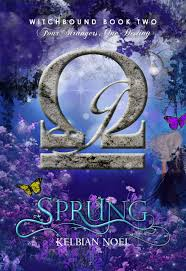 SPRUNG (book two) will be released on April 1, 2013. In Solana Beach, California we meet Skye Jackson, a seventeen-year-old girl who believes everything Baltimore never did. Ever since she was introduced to it, magic has come easily to Skye. She uses it for everything from extending her curfew to her personal GPS. But when she decides to teach a guy a lesson in order to avenge her friend, she comes to the realization that there’s a lot more to her powers than she bargained for.
SPRUNG (book two) will be released on April 1, 2013. In Solana Beach, California we meet Skye Jackson, a seventeen-year-old girl who believes everything Baltimore never did. Ever since she was introduced to it, magic has come easily to Skye. She uses it for everything from extending her curfew to her personal GPS. But when she decides to teach a guy a lesson in order to avenge her friend, she comes to the realization that there’s a lot more to her powers than she bargained for.
In a race to fix her mistakes, Skye stumbles across a family secret which reveals a twisted destiny that may mean giving up magic forever.
SMOLDER (book three) is set for release this coming August. At least that’s my hope! Currently, there is a contest taking place on my website. Readers can take a stab at guessing the name of the next Elemental. So I won’t reveal it here, but I will tell you a little bit about Elemental #3.
She’s a Latino orphan from Brooklyn, New York. After graduating from high school, she decides to spend the summer learning more about her family. Her magical journey leads her to a historical building, a long-lost family member, and a destiny that makes her more than she ever believed she could be.
The fourth book in the series is entitled SURFACE, and takes place in Hawaii. The fourth Elemental is a bit of a know-it-all. Well versed in the girls’ destiny and purpose, she leads them to their final battle.
The fifth book is still untitled but recaps the first four stories from the point of view of Ramon, a character readers will come to know well throughout the series.
2. Tell us about your childhood in the Maritimes. How did you evolve into the writer you are today?
I like to think of the story of my life as both unusual and interesting. I was born in Moncton, New Brunswick to Guyanese immigrants. My father was a Baptist minister who first settled in New Brunswick to study at St. Thomas University and what is now known as Crandall University. We lived there for the first few years of my life.
I fondly remember, and still visit, the tiny town of McKee’s Mills, but vaguely remember time spent in Turtle Creek, New Brunswick and then on Ben Jackson Road in Nova Scotia. One of my earliest memories is when we lived in Scot’s Bay, Nova Scotia. I can still recall that little house on the hill, with a mile long driveway, tire swing, and cows in the pasture beside it. I was four or five when we moved.
 We ended up in Lockeport, Nova Scotia after that, where Dad was called to serve at the Baptist church in the middle of town. We were the only black family in Lockeport, as far as I knew. Those were some formidable years, but still filled with great memories. Our house overlooked the harbor and had a huge forest of bamboo-like plants we called Roman Sailors in the back yard. We’d go crashing through those in the summertime, playing “scouts” after hours of riding our bikes around town. It was that time (mid-eighties) and that kind of town where kids could pretty much roam free.
We ended up in Lockeport, Nova Scotia after that, where Dad was called to serve at the Baptist church in the middle of town. We were the only black family in Lockeport, as far as I knew. Those were some formidable years, but still filled with great memories. Our house overlooked the harbor and had a huge forest of bamboo-like plants we called Roman Sailors in the back yard. We’d go crashing through those in the summertime, playing “scouts” after hours of riding our bikes around town. It was that time (mid-eighties) and that kind of town where kids could pretty much roam free.
Memories of Lockeport are still firmly engrained in my mind: the “haunted” house just up the street, my first teacher (Ms. Nickerson), first best friends (Sarah and Gina), the beach, the waves, the smell of the salt water. Of course,those are accompanied with some less desirable ones. Like the first time I was told I was different from the other kids. My lips were bigger, my skin darker, and my parents talked funny. I was called the “N” word on the first day of school. I was five and didn’t even know what it meant.
Like most ministers’ kids, I had to learn to adjust and adapt to new surroundings very quickly. The years from age eight to fifteen were spent in rural Nova Scotia. In the small town of Morristown in the Annapolis Valley we were again the only black family around for miles. And there were still formidable experiences to be had. But, for the most part, the people in that town were accepting and I felt like I belonged. This is where I first discovered my love of writing. I spent hours in a cow pasture adjacent to our house, behind the church and right next to a graveyard. There was an oak tree in the middle of the field and I’d sit under it with a blue writing folder, loose leaf paper, and a pen.
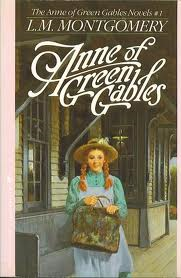 My mother had been selling Christian books through one of those mail order companies. That’s when I discovered Janette Oke “Christian” romance novels. My sister introduced me to L.M. Montgomery. Every Anne of Green Gables book she brought home, I read too. I also read The Babysitter’s Club and R.L. Stine (my first intro to Speculative Fiction). But in all of those series, except for one (thank you for Jessi, Ann M. Martin!), there was no one who looked like me. I decided I’d just have to write those kinds of stories myself.
My mother had been selling Christian books through one of those mail order companies. That’s when I discovered Janette Oke “Christian” romance novels. My sister introduced me to L.M. Montgomery. Every Anne of Green Gables book she brought home, I read too. I also read The Babysitter’s Club and R.L. Stine (my first intro to Speculative Fiction). But in all of those series, except for one (thank you for Jessi, Ann M. Martin!), there was no one who looked like me. I decided I’d just have to write those kinds of stories myself.
After we moved to Halifax, Nova Scotia, I was excited to finally be around people like me. Only after years of living like and amongst “the other half,” I didn’t fit in. I was the Black girl who acted like she was white. That was fun. But I didn’t let it get me down. I was who I was and I liked it.
My first job was in the Halifax North Memorial Public Library where my love of books was fed on a weekly basis. I couldn’t get enough. But for years I forgot about my writing endeavors until I started studying it in college. In my first year, I was introduced to the works of Octavia E. Butler (who quickly became my favorite author) and Gabriel Garcia Marquez. Still, it wasn’t until my final year during a Literary Theory class that I picked up a pen again and started writing a story, based on a dream, about werewolves in San Francisco. Since then, I’ve never stopped.
ABOUT KELBIAN
Name: Kelbian Noel
Hometown: Toronto, Ontario
Education: B.A. Professional Writing & Communications Studies
School: York University
Major: Professional Writing
Minor: Communications
Occupation: Author & Freelance Writer/Editor
FAVORITE THINGS
Books: Kindred, Blood and Chocolate
Writers: Octavia E. Butler
Quote: “There is no greater agony than bearing an untold story inside you.” ~ Maya Angelou


March 31, 2013
sweet snarl
It actually feels like spring here in Toronto—for once I’m not shivering through my visit, though I am wearing a hoodie I borrowed from my cousin. She’s out having Easter dinner with her in-laws so I thought I’d take a moment to blog. I’ve got way too much sugar in my system; in addition to Easter chocolate we’ve been snacking on English toffee and vintage candy from our youth, and yesterday I had the ultimate butter tart (no raisins!) at a cafe where I met African Canadian author Kelbian Noel. I’ll be posting an interview with Kelbian tomorrow to coincide with the release date of her second speculative YA novel, Sprung. Despite my sugar consumption, right now I’m feeling bitter and here’s why: Kelbian and I spent most of our time together bemoaning the difficulty of getting published while black in Canada. We also tried to develop some strategies for breaking through the color barrier, and one idea was to propose a panel to the coordinators of an established literary event. There’s an annual book festival in Toronto called Word on the Street and these are the stats they proudly share in their brochure.
65% Female, 34% Male
63% of our visitors have an annual household income of $50,000 and greater
28.3% of our visitors have an annual household income of $100,000 and greater
Our visitors come from a range of age demographics (total number of visitors 215,000):
Under 17 – 18% of visitors
18-24 years – 14% of visitors
25-34 years – 20% of visitors
35-44 years – 16% of visitors
45-54 years – 13% of visitors
55+ years – 20% of visitors
72% of our visitors have completed college/university
33% of our visitors have completed postgraduate studies (This is up from 30.9% in 2011)
73% of our visitors are from Metropolitan Toronto
27% of our visitors are tourists from outside the GTA
80% of our visitors describe themselves as avid readers
85% of our visitors consider The Word On The Street a key cultural event
Now, close your eyes and imagine what this book festival looks like. A third of the visitors are middle-aged; the vast majority of visitors are college-educated and a third have advanced degrees; nearly two-thirds are middle class and one third of their visitors make more than a hundred grand a year. Kids account for a fifth of the visitors, but if they’re brought by these highly educated, wealthy adults, chances are they aren’t struggling with literacy. In case you don’t know the city of Toronto, let me share some other stats:
Toronto is one of the world’s most multicultural cities. In 2004, the United Nations Development Programme (UNDP) ranked Toronto second, behind Miami, Florida, in its list of the world’s cities with the largest percentage of foreign-born population. Miami’s foreign-born population is dominated by those of Cuban and Latin American descent, unlike Toronto’s foreign-born population, which is not dominated by any particular ethnic group.
The 2006 census indicates 46.9% of Toronto’s population is composed of visible minorities; 1,162,630 non-Whites, or 23% of Canada’s visible minority population, live in Toronto; of this, approximately 70% are of Asian ancestry. Annually, almost half of all immigrants to Canada settle in the Greater Toronto Area. In March 2005, Statistics Canada projected that the combined visible minority proportion will comprise a majority in both Toronto and Vancouver by 2012.
2006: 46.9% (South Asian: 12.0%, Chinese: 11.4%, Black 8.4%, Filipino 4.1%, Arab/West Asian: 2.6%, Latin American 2.6%, Southeast Asian 1.5%, Korean 1.4%, multiple 1.3%, not included elsewhere 1.0%, Japanese 0.5%)
Poverty is also on the rise in Toronto, with almost 25% of the population living hand to mouth:
Toronto’s poverty rates are higher than the provincial and national average. Overall, recent immigrants fare the worse with nearly half (46 per cent) in poverty. One in three children (under age 15) is living in poverty and 31 per cent of youths (15 to 24). Housing costs is the big driver, with almost 47 per cent of all tenants paying more than 30 per cent of their income on rent. Another 23 per cent pay an astonishing 50 per cent or more on rent.
So. Let’s revisit the stats for Word on the Street. I’ve never attended or presented at this event, but feedback from attendees seems overwhelmingly positive. Yet does this literary event accurately reflect the 21st-century city of Toronto? Are they actually achieving their objectives if their attendees represent such a small (and privileged) slice of the population? Do you think their featured authors reflect and/or are likely to appeal to people of color (who make up 50% of the city’s population)?
Mission
The Word On The Street Toronto is a non-profit organization that celebrates Canadian reading and writing, and champions literacy, primarily through a free, annual outdoor festival.
Objectives
To ensure that the people of Toronto know about the annual festival, and value it as having the best and broadest offerings within the Canadian publishing industry.
To ensure that The Word On The Street helps Toronto become 100% literate through its effective support for literacy awareness and programs.
To ensure that The Word On The Street Toronto is a valuable and vital event for the Canadian publishing industry and a top choice for Canadian authors, publishers and booksellers.
Right now I’m thinking it’s not worth my time to approach the organizers of this event. I may send them an email, however, and hip them to Pop Up—a nonprofit in the UK that brings literature to communities that are too often ignored by big splashy book festivals…





